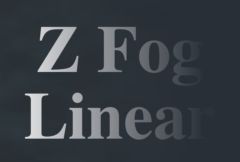S_ZFogLinear
Mixes a fog color into the source clip using depth values from a ZBuffer input. The fog amount varies linearly between Fog Near and Fog Far as the depth varies between Z Near and Z Far. The ZBuffer input will be solid black if not provided, so you should specify this input for this effect to do anything useful.In the Sapphire Stylize effects submenu.
Inputs:
-
Source: The current layer. The clip to be processed.
- ZBuffer: Defaults to None. The input clip containing depth values for each Source pixel. These values should be in the range of black to white. Normally black corresponds to the nearest objects and white to the farthest.

|